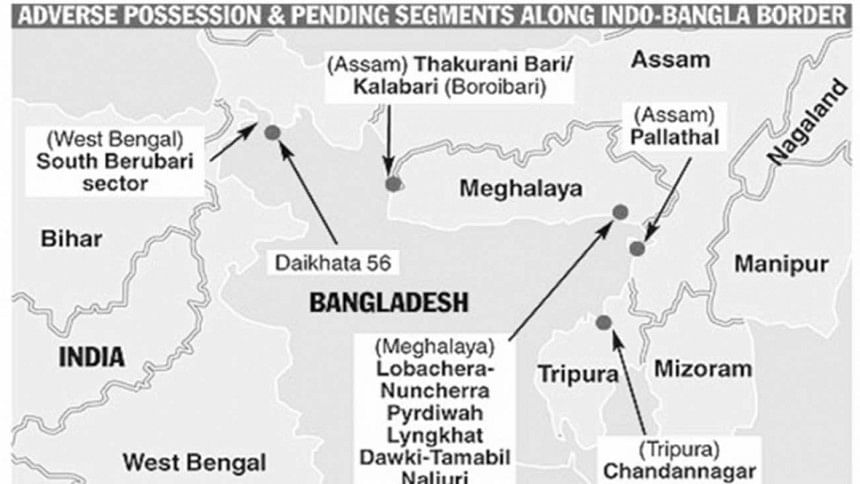Land deal now on track

The Indian cabinet yesterday approved the constitution amendment bill on the Land Boundary Agreement (LBA) with Bangladesh to pave the way for permanent settlement of decades-old boundary disputes.
The BJP wanted to amend the bill keeping Assam out of its purview apparently as part of its political calculations in the state where assembly elections are slated for early next year.
But the ruling party had to include Assam in the bill in the face of strong resistance from the main opposition, the Congress Party.
The Indian government will now move for passage of the bill in Rajya Sabha and Lok Sabha to facilitate exchange of enclaves, transfer of adversely possessed areas and demarcation of un-demarcated border.
The bill is likely to come up in Rajya Sabha today. If gets through, it will be placed in Lok Sabha tomorrow, say diplomatic sources in New Delhi.
The bill has to be passed in each House by a majority of not less than two-thirds of the members of that House. And it will require ratification by at least half of the members of the state legislatures of West Bengal, Assam and Meghalaya before it comes into effect.
The clearing of the bill by the cabinet came a day after the top leadership of the BJP and the RSS discussed the issue with their Assam leaders on Monday night. They decided to include Assam, sensing if the bill excludes the state, it would have no chance of passage in Rajya Sabha, where the BJP lacks majority.
The bill's approval indicates the BJP government's resolve to get it cleared in parliament, bringing all parties on board, say analysts.
According to diplomatic sources in Dhaka and New Delhi, if the bill is passed, Indian Prime Minister Narendra Modi might visit Bangladesh sometime next month.
Modi had earlier indicated that he would visit Dhaka when one of the two pending issues --- Teesta water sharing agreement and the LBA -- would be deliverable.
After the cabinet cleared the bill yesterday morning, Indian External Affairs Minister Sushma Swaraj met Rajya Sabha Chairman Md Hamid Ansari to inform him that the government wants to take up the bill in Rajya Sabha today, said sources.
Swaraj later told Ghulam Nabi Azad, leader of the Opposition in Rajya Sabha, and Anand Sharma, deputy leader of Congress in Rajya Sabha, that the bill would include Assam along with West Bengal, Tripura and Meghalaya.
Azad and Sharma then talked to Congress President Sonia Gandhi about it, after which the party decided to support the bill.
Contacted, Sharma said, "It is our bill. We supported it only when Assam was included. We had made it clear that we will oppose the exclusion of Assam from the bill tooth and nail. With Assam now included, we have no problem with the bill. We will support it."
In her reaction, West Bengal Chief Minister Mamata Banerjee said her government supported the LBA with Bangladesh as people wanted it.
She sought a package from the Centre for rehabilitation of those to be affected in exchange of adversely-held enclaves.
"With [rehabilitation] package, we are supporting it [agreement]," Mamata told reporters in Jalpaiguri.
Meanwhile, the Assam government said it is going ahead with the LBA with full support of the residents of Karimganj and Dhubri districts where the protocol will be implemented.
"If we do not have support of the local people, we cannot get anything forcefully. But we have full backing of the people of Karimganj and Dhubri districts," Assam's Additional Chief Secretary (Revenue) Subhash Chandra Das told reporters in Guwahati.
The passage of the LBA will correct the haphazard drawing of the Radcliffe Line that separated West Bengal and then East Pakistan in 1947.
Following Bangladesh's independence, Bangabandhu Sheikh Mujibur Rahman and Indira Gandhi signed the agreement on May 16, 1974. But its ratification has been due for more than 41 years.
Once ratified, it will bring an end to the miseries of the people living in the landlocked enclaves without citizenship over decades.
According to the LBA protocol signed during then Indian PM Manmohan Singh's Dhaka visit in September 2011, people living in border areas will not be dislocated and all areas of economic activity relevant to homestead will be preserved.
Recently, there was confusion and uncertainty after the BJP moved to exclude Assam from the LBA amid Assam BJP's strong opposition to the state's inclusion in it. The Assam BJP apprehended that the state's inclusion could ruin its chances in the next Assembly elections.
But the Congress Party opposed the move, and warned it would resist tabling the bill in Rajya Sabha if Assam is not included in the LBA bill. Congress is in power in Assam and has majority in Rajya Sabha, the upper house of Indian parliament.
FACTS ABOUT LBA
The LBA has three components. One is un-demarcated land boundary of approximately 6.1 km in three sectors in Bangladesh's Nilphamari and India's West Bengal, Muhuri River in Bangladesh's Feni and Belonia in India's Tripura, and Lathitila-Dumabari in Bangladesh's Moulvibazar and India's Assam.
The other two are exchange of 162 enclaves and over 5,000 acres of adversely possessed land.
India will transfer 111 enclaves with 17,158 acres of land and a population of 37,369. The enclaves are spread across four districts in Bangladesh -- 12 in Kurigram, 59 in Lalmonirhat, four in Nilphamari and 36 in Panchagarh.
The 51 Bangladeshi enclaves, all located in Cooch Behar of West Bengal, have 7,110 acres of land and population of 14,215.
Once the exchange is done, Bangladesh will have a net gain of around 10,000 acres of land.
The exchange of enclaves will fulfil a major humanitarian need to mitigate the hardships that the enclaves' inhabitants had to endure for over six decades for lack of basic amenities and facilities.
In respect of adversely possessed land, India will get 2,777.038 acres and transfer 2,267.682 acres to Bangladesh.

 For all latest news, follow The Daily Star's Google News channel.
For all latest news, follow The Daily Star's Google News channel. 



Comments